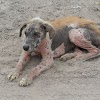Ivermectin toxicity in
German shepherd cross breed dog, A case study
Ganesh Ranabhat (AFU, 8th
sem)
Overview
It is a prototypic
avermectin drug used in a variety of species as antiparasiticide. It is a
mixture of 80% or more of an analog of avermectin B1a and 20% or less of an
analog of avermectin B1b. Avermectin have no antibacterial or antifungal
activity. These compound are produced by the actinomycete Streptomyces avermitis. In dog and cat ivermectin is
approved only for use as a control for heartworm. It has also been used as a
microfilaricide, ectoparasite and endoparasite.
Ivermectin can
interact with other medication, vitamin or herbs. This can be harmful or
prevent the drugs from working well. Toxicity can occur if dog is given an
excessive dose of the medication( 10-20 times) the recommended dose.
Additionally certain dogs are genetically hypersensitive to the medication. In
these dogs ivermectin can pass directly to the brain and be the toxic or even
lethal.
A genetic
sensitivity to the ivermectin be seen in several breed most commonly Collie,
Australian shepherd, German shepherd etc. The median lethal dose (LD50) of
ivermectin for beagle dogs has been reported to be about 80mg/kg and the
highest single oral dose without and adverse clinical effect was 2mg/kg.
History and clinical observation
A German shepherd
cross male dog 14 month old weighing 14.5 kg was taken to the district
livestock office Tanahun in 2077-2-29. Shyam sundar paudel came for the
treatment with the complaint of vomiting, lethargy, ataxia, disorientation,
tremors, seizure, dilation of pupils. The dog was treated for tick infestation.
The dog was injected
4 ml of Ivermectin IM 18 hours before to treat ectoparasite. After a certain
hour animal became restless and exhibit clinical sign like hypothermia,
mydriasis, incordination, grinding the teeth, circling movement, seizures.
Blood chemistry parameter were normal ( table1). On the basis of anamnesis and clinical observation the case was diagnosed as a ivermectin
toxicity.
Treatment and discussion
Toxicity cannot be
reversed with the medication. There is no specific antidote for ivermectin
toxicity. The treatment protocal for it is only managemental care, nursing,
supportive therapy and symptomatic treatment. The dog was treated with neostigmine@0.05mg/kg BW S/C repeated 6 hourly , dexamethasone@0.25-0.5mg/kg BW IM BID and optineuron@1 ml total dose with
infusion of 200ml dextrose(5%) IV and atropine sulphate@0.02-0.04mg/kg BW IV. The dog recovered after 2 days of regular treatment.
Collie breed of dog
are must susceptible to ivermectin. It may exhibit a shock like reaction. Neurotoxicity possible
mostly in collie( those with gene defict ; deletion mutation of motor 1 gene).
Ivermectin is actively transported by the p-glycoprotein pump. Due to autosomal
recessive trait (MDR-1) gene that cause a defict in p-glycoprotein leads to
increase the permeability of blood brain barrier to the drug and this allow
passage of ivermectin to the brain at low dosage thus causing toxicity. In our
case, the animal was young and the blood brain barrier might not have been
fully developed leading to toxicity. If we had not treat it timely it may
collapse. Unfortunately, ivermectin toxicity cannot be reversed therefore, it
is wise to treat the symptom to the best as we can.
Table1. showing normal blood chemistry profile of dog
affected with ivermectin toxicity.
Parameter
|
Day 0
|
Reference value
|
RBC(×1O3/µL)
|
5.6
|
5.5-8.5
|
WBC(×103/µL)
|
6
|
6-17
|
PCV(%)
|
39
|
37-55
|
Haemoglobin(g/dl)
|
12.8
|
12-18
|
Monocyte(%)
|
5
|
3-10
|
Neutrophil(%)
|
75
|
60-76
|
Basophil (%)
|
3
|
0-11
|
Eosinophill(%)
|
2
|
2-10
|
Lymphocyte(%)
|
28
|
12-36
|
Albumin(g/dl)
|
2.8
|
2.6-4
|
Globulin(g/dl)
|
2.6
|
2.6-3.6
|
Creatinine(mg/dl)
|
0.6
|
0.5-1.5
|
BUN(mg/dl)
|
26
|
18.5-55.4
|
Phyostigmine is
an anticholinesterase drug can be used for the improvement of clinical sign.
Management can be overcome by kept in mind about the drug interaction to it.
Ivermectin is photolabile so should be ptotect from light so store ivermectin
product at room temperature.








1 Comments
Such a good analysis��
ReplyDeleteI agree with you that with age, animal develop reduceed function of blood brain barrier. The more you get old, your blood brain barrier (bbb) capacity will decrease which leads to invasion of harmful elementes in the brain. Critical factor leading to reduced bbb function is the lower amount of P-pg. Other than that, there are structural changes in blood-brain-barrier with aging which alter its function.